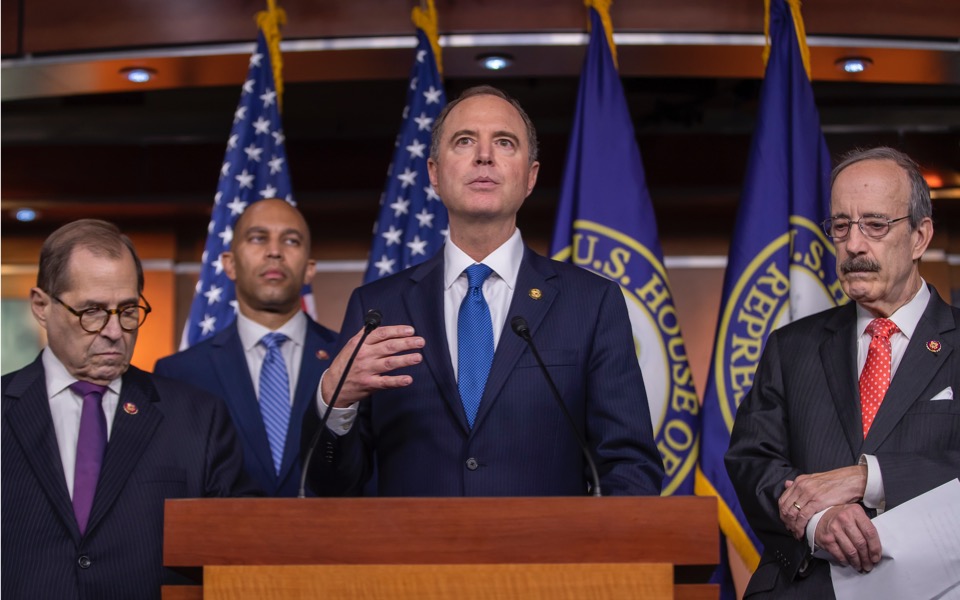The ramifications of the Ukraine scandal on US politics

There have been impeachment trials in the United States before, but never in an environment as polarized as this. Following the Mueller investigations, it looked like the current era of political tribalism would prevent House Speaker Nancy Pelosi from even bringing forward articles of impeachment against President Donald Trump. Why imperil Democratic candidates in swing states for an inherently political process that would just die in the Republican-controlled Senate? The political math didn’t add up.
But the Ukraine revelations changed that calculus. The speed that the Ukraine developments hit, and the severity of the charges – a sitting US president withholding taxpayer money from an ally unless they opened an investigation into his political opponent and their family – provided the political punch that the Mueller investigations never did (or arguably ever could). Suddenly, the entire Democratic Party was behind impeachment, not just its most extreme elements.
The American people seem sufficiently disturbed by the disclosures – some from whistleblowers, some from the White House itself – that an average of polls showed that 51 percent of Americans supported impeachment investigations the week after they were launched. A select number of Republicans have even gone on record to criticize the president, a rarity for our political times. Despite all that, it remains extremely likely that Trump will be acquitted in the Senate; two-thirds of the Senate must vote to convict a US president and kick him out of office, meaning 20 Republicans would need to sacrifice their own political careers to oust Trump, who remains popular among the Republican base.
Nevertheless, even a failed impeachment bid will have an impact on American politics going forward. The first and most obvious effect is on the president himself, who has already begun displaying erratic behavior, both on Twitter and in real life. The surreal press conference with the Finnish president in early October was not an aberration, but a sign of things to come. More disturbing was Trump’s call for China to start investigating his political opponents as well – to normalize his initial misstep, Trump has opted to make his following missteps even bigger. It’s a dangerous strategy, but Trump has always been a risk-taker, in both business and politics.
Then there are the changes to US personnel. Special envoy to Ukraine Kurt Volker has already resigned, but even more critical Trump administration figures – like Secretary of State Mike Pompeo and/or Attorney General William Barr – may be forced to depart as more information about the Ukraine scandal surfaces, weakening Trump’s ability to execute on what’s left of his political agenda. On the domestic front, the US is looking at a year-plus of legislative paralysis (excepting possibly the United States–Mexico–Canada Agreement trade deal ratification, which Democrats also support).
That makes it more likely Trump will look to the international arena for political wins ahead of 2020 elections – expect more movement on renewed summit talks with North Korea, increased urgency from the US to draw down its troops in Afghanistan, and more willingness to engage with the Iranians. These might not be moves that are in the US interest over the long term, but they will be in Trump’s short-term political interest. For him, that’s the priority.
Yet the biggest impact of impeachment proceedings will be to push the US closer to a constitutional crisis with the 2020 election at its heart. When former president Bill Clinton was impeached, it was a question of whether he had obstructed the investigation into himself; that was what a Mueller-based impeachment of Trump would have likely been. But this impeachment will call into question the legitimacy of the American political process itself, and whether US elections have been compromised by foreign actors, potentially at the urging of US officials.
Regardless if Trump is acquitted or convicted, roughly half the US population will feel wronged by the proceedings, and will entrench themselves further into their political base. The end result will be an American public much more likely to view the 2020 results as illegitimate should their preferred candidate not win. Think Bush vs Gore, but with the defeated party unprepared to accept defeat. All of which is to say – if these last few weeks of US politics has taught us anything, it’s that the worst is yet to come.
Ian Bremmer is the president of Eurasia Group and GZERO Media and author of Us vs. Them: The Failure of Globalism. His Twitter handle is @ianbremmer and he is on Facebook as Ian Bremmer.





